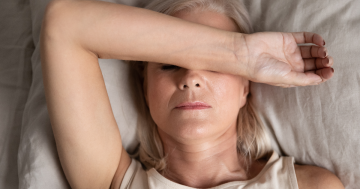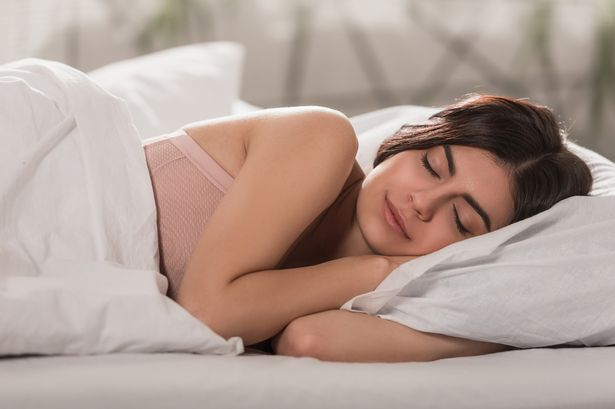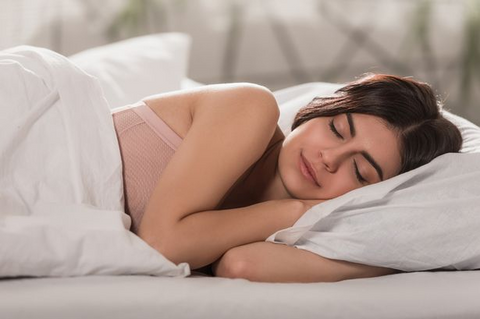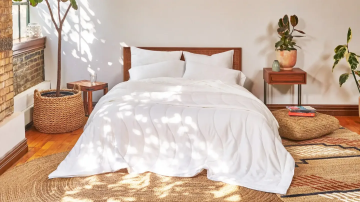You wake up soaked in sweat. You toss and turn in the middle of the summer night. If you find it harder to sleep during the summer months, you’re not alone. Studies have shown that night sweats, also known as “hot sleep,” can affect 10% to 41% of people.
While in summer, the situation can be much more common. Rising temperatures and changes in sunset and sunrise can affect the timing and quality of sleep. Longer hours of light may make it harder to get to bed earlier, and heat may keep you awake - or keep you tossing and turning in a sweat. Read on to learn why and what you can do about it.

Why do I get so hot when I sleep
According to The National Sleep Foundation , the ideal sleep temperature is between 60 and 67 degrees Fahrenheit. Our body temperature drops one to two degrees before and during sleep to conserve energy and help the body focus on other mechanisms, so we go to sleep more easily when the room temperature is slightly below normal. The bed is already a warm environment because there is less air movement around you than if you were standing or lying in a hammock, and you (and your bed partner) are contributing a lot of body heat. Also, if the ambient temperature around your bed is hot and humid (as it may be in the summer), this makes it more difficult for you to fall asleep.
But hot sleep may also have less to do with external temperatures and more to do with internal processes. For example, hormonal changes brought on by menopause or hyperthyroidism can affect the regulatory system and cause your temperature to rise when you sleep.
Metabolism can also play a role. Preferring to eat and exercise too close to bedtime can amplify your body’s metabolic rate. This disrupts temperature control and sleep quality. Overheating at night can even be caused by certain medications, such as some painkillers and antidepressants.
Again, this can happen because your body’s thermoregulatory system is disturbed. Some conditions, such as anxiety and hyperhidrosis, actually make your sweat glands more responsive. This can potentially lead to night sweats and hot sleep.
As you can see, there are variously potential causes of hot sleep, which can vary from person to person.
How to sleep in hot weather without an AC
When you are disturbed by heat during summer night, an air conditioning would be a wonderful luxury. But if you don’t have a AC in your house or want to lower your energy bill, there are many other ways to get you a good night’s sleep in hot summer.
Keep the blinds closed during the day
To regulate the temperature, consider closing the blinds to reduce heat during the day. This small shift can actually make a big difference. According to the U.S. Department of Energ, when closed, cellular shades can reduce unwanted solar heat through windows by up to 60%. If you don’t want to invest in something that expensive, even medium-colored fabric curtains with a white plastic lining can reduce heat gain by 33%.
Keep humid and hot air out
Reducing humidity and increasing air flow in your bedroom can also help you get a better night’s sleep - especially in the summer, when even the coolest sleepers wake up in a sweat. A dehumidifier will aid in moisture control and keep the relative humidity between the ideal 30%-50%.
You’ll get more out of these machines if you pay attention to where your electric fans are located and how they are set up. Stand-up fans and their window-mounted counterparts are effective cooling products. Place the fan in front of a bowl filled with ice. As the ice melts, the fan’s breeze blows the water vapor away, giving you a cool whiff of air. Or, by facing the fan out the window, you can blow hot air out of your stuffy room. As the outdoor temperature drops overnight, the warm air being expelled will be replaced by cooler air. It’s even better if you open the second window to get a cross breeze.
Turn off the lights and electronics
All light bulbs give off heat, which is something you don’t want when trying to get a good night’s sleep. In the summer, light stays on much later, so take advantage of this and try to keep your light usage to a minimum. Not only will this make your room cooler, but it’s also easier to fall asleep if you lower your lighting levels before bedtime.
Similar to turning off the lights, turning off electronics can be just as beneficial. Devices like your smartphone emit heat and light that are not conducive to a good night’s sleep. So, put them away at least an hour before bedtime for a more restful sleep.
Keep water by your bed
Dehydration can make it difficult for you to regulate your body temperature, and this principle applies at night as well as during your daytime workouts. If you’re feeling uncomfortable when it’s time for bed, a few sips of water can help release stored heat from your body and give you some much-needed relief. On a particularly hot summer night, you’ll want to keep a jug of cold water and a cup on your nightstand so you’re ready to cool down temporarily. Be sure to add some ice cubes to the jug to keep it colder for a longer period of time.
Invest in a cooling mattress
Mattresses are also a potential cause of hot sleep. Low-quality foam restricts air flow, which means your natural body heat is trapped on the surface where you sleep. This leads to tossing and turning and disrupts your body’s sleep cycle.
The best mattresses will use a variety of tools to help you sleep cooler, such as gel-filled or plant-based foams. Fortunately, many brands of mattresses make an effort to stop their mattresses from sleeping hot. Except upgrading the foam, some brands also pair the mattress with a cooling cover, such as Zonli cooling floor mattress. The cooling material aid in a comfortable and restful sleep in summer night.
Make your bedding right
When it comes to sleeping comfortably without an AC, the right bedding can make all the difference. Synthetic blankets and sheets made from polyester only serve to trap heat and make you warmer. Flannel or wool, these heavier natural fibers, won’t do you much good in hot summer either. Instead, use breathable bedding made from fabric like linen, bamboo viscose and cotton . If you prefer cotton, go for lighter sheets that feel cooler on your skin, like percale or sateen.
Also, take a look at your pillow. A pillow specifically designed with breathable components can reduce sweating, overheating, and the general discomfort that comes from sleeping hot. Keeping a cool head helps the body to regulate its core temperature. If our body heat up too much, then it will try to dissipate the heat by pumping blood to our hands, feet, and head. By transferring the heat through to the pillow, our bodies cool down and allow us to sleep more deeply.
Benefits of temperature regulating bedding
Hot sleep can turn a peaceful night’s sleep into a damp mess in no time. Fortunately, various temperature regulating bedding has been created to solve the problem. Let’s take a look what exactly these bedding can do for hot sleepers.
Improved sleep quality – By helping your body maintain a comfortable temperature, temperature regulating blankets have been shown to improve sleep quality. The breathable fabric of these bedding wicks away moisture and absorbs heat.
Lower air conditioning costs - By removing excess heat through fabric and thermal conductivity technology, temperature regulating blankets make it less likely that you’ll have to turn down your air conditioner for much-needed relief.
Aids in weight management- The number of calories our body burns at rest depends on the amount of muscle we have. As our body temperature drops during sleep, it helps produce the human growth hormone that contributes to tendons and muscles heal. The level of cortisol or stress hormone in our body also drops. A drop in cortisol is associated with hunger, meaning we are less likely to give in to food cravings during the day.
Boosts energy and mood- If the blankets and sheets are too hot, hot sleepers have a hard time falling asleep. As a result, they waste the entire night. Lightweight, breathable bedding can speed them into a healthy, deep sleep by eliminating the annoying feeling of being too hot all the time. The ideal environment can make their sleep more pleasant and restful, so that they wake up the next day feeling energized and refreshed. Getting enough sleep has been shown to help relieve pain, anxiety and concentration.



